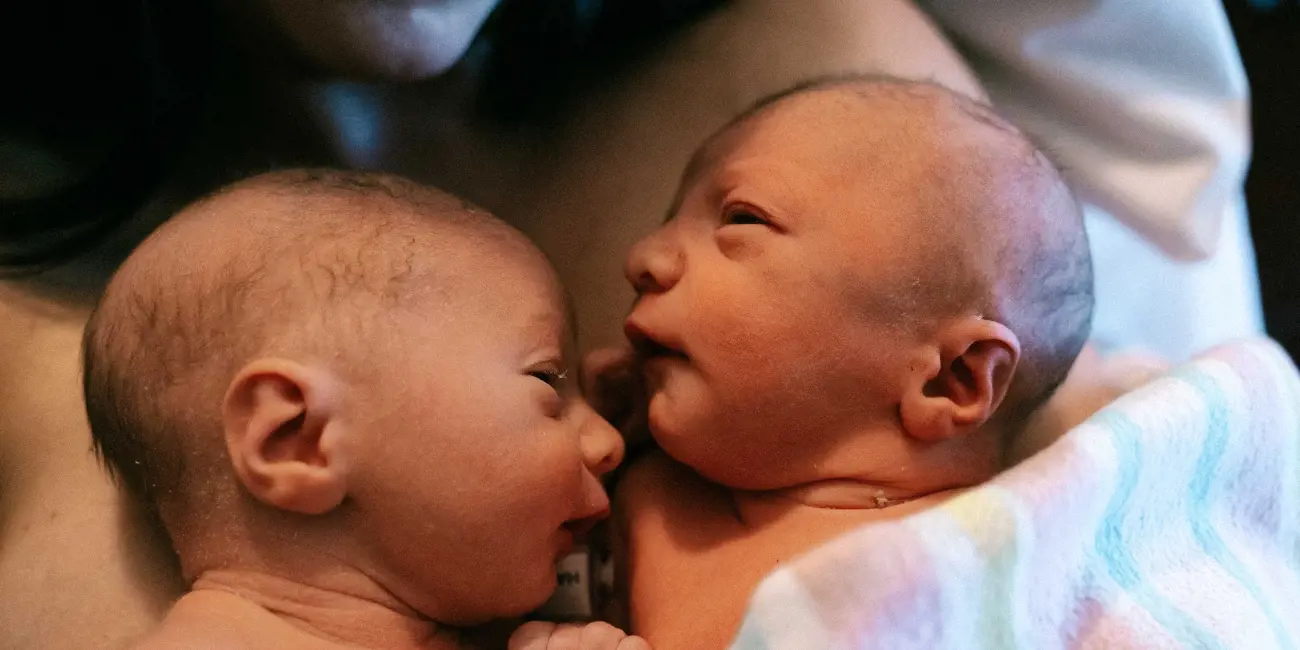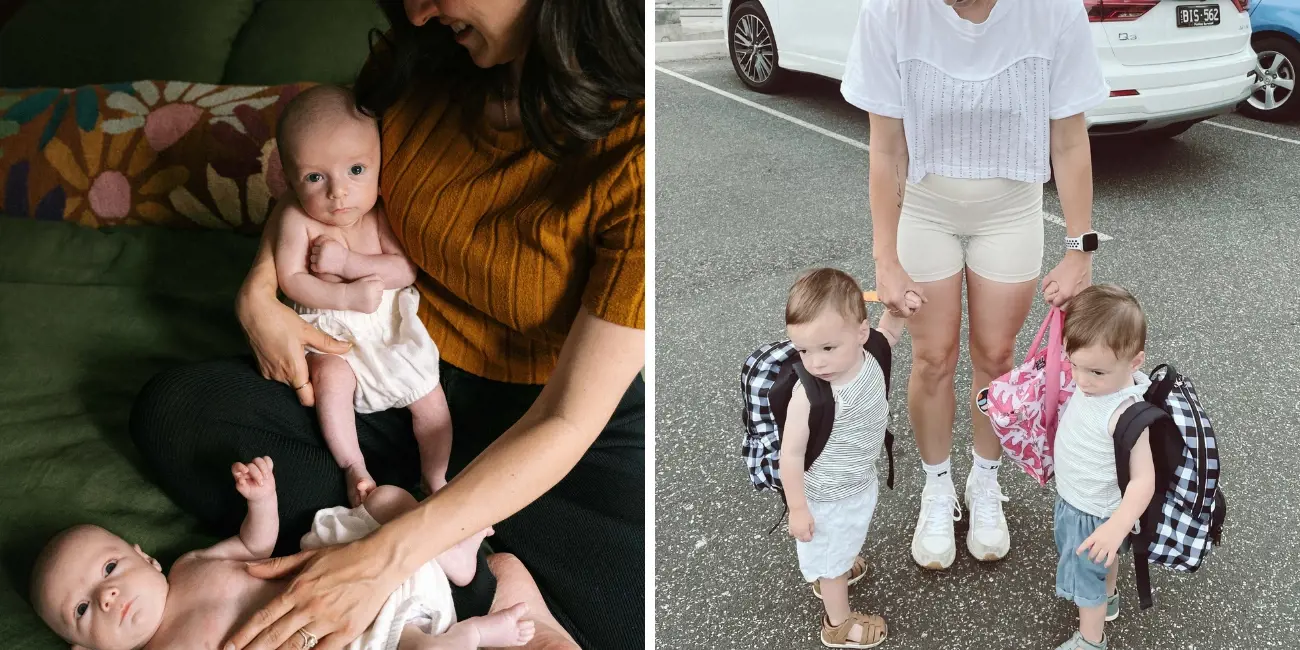Congratulations, you're pregnant… and it's twins! We can only imagine the mixed feelings of expectant parents when they hear this news. That's why we thought it best to bring in a real expert when it comes to all things multiple births, Natasha, mother of twin boys, Miles and Leo.
Natasha speaks to life of a ‘multiples mum’ as well as highlights the important changes, outlined in the 2023 AMBA Multiplies Matter report released in Multiples Birth Awareness Week.
It's twins!
When Natasha found out she was pregnant with twins, she was so excited!
“I always dreamt of having twins, so my husband and I were of course over the moon. We felt so privileged to have luck fall our way (identical twins are not hereditary). I was, however, naïve about what being a first-time parent (especially of multiples) entailed.”
Natasha had no idea about the potential complications of twins. For those who aren’t aware and don’t know the risks, they differ greatly depending on the type of twins.
“My obstetrician was the first to explain to me some of the risks we would face. We learned that if our twins shared the same inner amniotic sac, I may have been hospitalised early into the pregnancy to reduce the risks of complications. Thankfully, mine shared a placenta but each had their own inner amniotic sac (the term for these types of twins is monochorionic diamniotic)."
Further risks
After digesting that information, Natasha and her husband learned that with a shared placenta, her twins could develop a fatal condition called Twin-Twin Transfusion Syndrome (TTTS) which results in one twin effectively taking the other twin’s blood supply.
“The risk of TTTS meant I had to have fortnightly ultrasounds from 12 weeks to birth. Safe to say, we were spending a tonne on fortnightly ultrasounds (we hit the Medicare cap), as twin ultrasounds take longer. My obstetrician also told us to mentally prepare for a NICU (neonatal intensive care unit) as this was extremely common for multiples.”
Even the best laid plans can change
Natasha was very fortunate to have had a complication-free pregnancy, but her obstetrician's advice was still that twins were considered high-risk and he, therefore, recommended a planned caesarean at 37 weeks. He explained that one twin can become distressed with vaginal birth which can lead to complications.
With that advice in their arsenal, Natasha and her husband decided to go ahead with a planned c-section.
Natasha ended up going into labour on the day of their planned c-section (apparently,it's common!) but the birth soon became an ‘emergency’ caesarean. As anyone who has had a caesarean knows, mobility amongst other things becomes an issue postpartum.
“My caesarean wound was as good as you could hope for, but it did make mobility hard, particularly when you have two newborn babies to care for at once.”

Welcome Earthside
With their entrance to the world a little early, Miles and Leo were too weak to feed themselves which meant they needed to go into the NICU for almost three weeks and be hooked up to feeding tubes. This made breastfeeding very difficult from day one, as they struggled to latch on and, or stay awake and so, the midwives began feeding the twins with formula.
Natasha speaks to life as a multiples mum
“From birth, it has been a wild ride. Breastfeeding was an uphill battle from day one, given the logistics. I couldn't feed them both together because they were too small and their stay at the NICU affected my supply from early on. From there, it was a steep learning curve of working out how to juggle two babies when feeding (thank God for twin pillows), sleep settling, and bathing.”
As for isolation?
“I found it quite isolating. My mother’s group was super supportive in any way they could be, but the singleton mums in my circles couldn't relate or didn’t know how to help. Quite often I just was too exhausted and overwhelmed to leave the house.”
What about now?
Natasha explains it’s all the small things. Things like getting in and out of the car, not being able to carry them both at once, dressing and changing them, and cleaning up the food mess – every day is exhausting!
“Now that Miles and Leo are 19 months old I am finding it challenging to take them out on my own. They run in opposite directions (boys am I right?) and I always need two people.”
“And the sickness from day care - don’t even get me started! Once my parents had to come and watch the twins who had gastro (contracting it themselves) after my husband, and I become bedridden,” Natasha recalls.

It’s all about awareness and support
On March 20, 2023, the Australian Multiple Births Association (AMBA) released a report outlining the significant deficits in support for multiple births in Australia and its recommendations. We explore some of these with Natasha and what the proposed changes mean to her family.
Did you know?
Currently, in Australia, a parent of a singleton receives the same term of parental leave as a mother of twins born prematurely.
“I couldn’t believe that there are no additional paid parental leave payments for twins (they kick in only for 3 or more multiples). You have double the expenses from nappies (we went through 120 nappies or more per week!) to clothes and formula. We also had to buy a twin pram, two cots, and two car seats. We tried to wing it with some things, for example, we decided not to get a capsule given the limited term of their use. A one-off lump sum payment would have been extremely useful in this regard.”
Natasha’s husband could only take one month off. He was not entitled to any paid leave from the government so, sadly Natasha had to take care of Miles and Leo on her own, regularly having to ask family for help.
“Additional paid leave or entitlements may have meant I could have had his help for longer in those early days of bringing the boys home. Given the twins were in the NICU for almost three weeks, I only had him home full time with me for about a week. Even now the boys are 19 months old, my parents help one day a week. My mum had to take long service leave to come over and help me in the early days.”
Calling for help!
Given that 61% of parents with multiples experience mental health challenges in their first year, Natasha also believes that priority access to counselling with some form of funding, or a subsidy is critical for parents of multiples.
“I have in the past and still to this day battle with depression, anxiety, and overwhelm. For me, every day presents new and different challenges, and all parents of multiples should have the support they need to navigate their way through these challenges.”
New report recommends important changes
In line with Multiple Births Awareness Week, the AMBA and PerCapita are recommending policy changes that will lead to improved outcomes for multiple-birth families.
The report contains several recommendations for policy change, including:
- Multiple Birth Grant: A one-off payment of up to $15,000 for twins, $30,000 for triplets, and $45,000 for quadruplets.
- In-home support: 240 hours of hands-on help for twins to be used within 12 months and 1560 hours for triplets and other higher order multiples to be used within 24 months.
- Extension of paid parental leave: 8 additional weeks of parental leave for twins; 16 weeks additional for triplets; 24 weeks additional for quadruplets.
If you’d like to help, you can sign the petition for change.



































